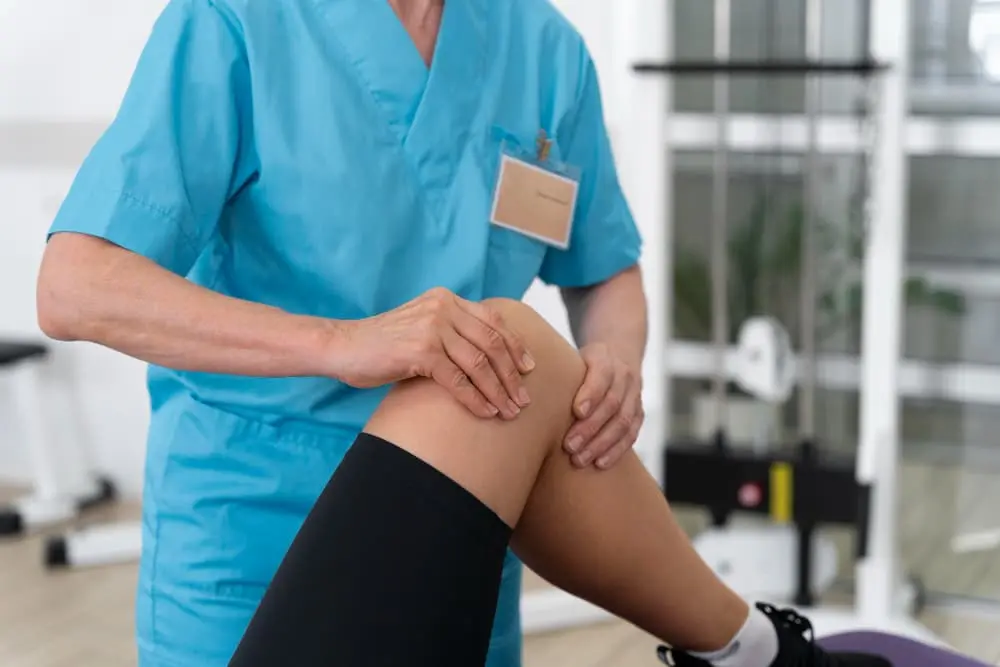Knee replacement surgery can transform life for those struggling with chronic pain, stiffness, and limited mobility. But surgery is only the first step; recovery and rehabilitation determine long-term success. Patients who follow the right recovery plan usually regain strength faster, reduce pain sooner, and enjoy more freedom in daily activities.
In this blog, we’ll share essential knee replacement surgery tips for recovery, helping you avoid setbacks and build a smoother healing journey.
1. Commit to Physiotherapy
Physical therapy is not optional; it’s the cornerstone of recovery. After surgery, muscles around the knee become weak, and joints can feel stiff. Regular physiotherapy helps restore strength, flexibility, and balance.
Tips:
- Start therapy as early as your doctor advises.
- Follow all home exercise instructions consistently.
- Don’t rush, gradual progress is safer than sudden exertion.
2. Manage Pain Wisely
Discomfort is natural after surgery, but unmanaged pain can interfere with exercises and sleep. The goal is not to eliminate all pain but to keep it at a manageable level.
Tips:
- Take pain medications as prescribed.
- Apply ice packs to reduce swelling.
- Elevate your leg when resting to improve circulation.
Effective pain management ensures you can move and exercise without fear.
3. Balance Rest and Movement
Recovery is a mix of gentle activity and adequate rest. Too much movement may strain the knee, while too much rest can cause stiffness.
Tips:
- Walk short distances regularly, increasing gradually.
- Use walking aids (walker or cane) until you feel stable.
- Avoid sitting or lying still for long hours, do ankle pumps or stretches to keep blood flowing.
Maintain a Healthy Diet
Nutrition plays a critical role in healing. The right diet supports tissue repair, strengthens bones, and prevents weight gain that can overload the new joint.
Tips:
- Include lean protein (fish, eggs, legumes) for muscle repair.
- Add calcium and vitamin D for bone health.
- Stay hydrated to aid circulation and reduce fatigue.
- Limit sugary and processed foods that can slow healing.
4. Protect the Surgical Site
Infections and wound problems can delay recovery. Proper care of the incision ensures safer healing.
Tips:
- Keep the surgical site clean and dry.
- Watch for redness, pus, or unusual swelling.
- Follow your doctor’s dressing change instructions.
- Avoid soaking the wound until it’s fully healed.
5. Sleep and Mental Wellbeing
Healing happens faster when the mind and body are well-rested. It’s normal to feel frustrated or anxious during recovery, but staying positive makes a big difference.
Tips:
- Sleep 7–8 hours daily for optimal healing.
- Use pillows for knee support when lying down.
- Practice relaxation techniques like deep breathing.
- Stay socially connected to avoid isolation.
6. Avoid Common Mistakes
Some habits may slow or even reverse recovery progress. Knowing what not to do is as important as following the right steps.
Avoid:
- Skipping physiotherapy sessions.
- Overexerting too soon (climbing stairs, lifting heavy items).
- Ignoring persistent pain or swelling.
- Neglecting follow-up appointments.
By avoiding these, you’ll maximise the benefits of the procedure.
7. Follow Your Surgeon’s Guidance
Every patient’s recovery timeline is unique. What works for one person may not suit another. Trust your doctor’s personalised advice regarding exercises, activity levels, and medications.
Long-Term Lifestyle Tips
Even after recovery, your new joint needs lifelong care:
- Stay active with low-impact exercises like swimming or cycling.
- Maintain a healthy weight to protect your new knee.
- Keep strengthening leg muscles for joint support.
- Continue follow-up checkups to monitor implant health.
Conclusion
A successful knee replacement doesn’t end in the operating theatre; it continues in your daily choices. By following these knee replacement surgery recovery tips, you can accelerate healing, minimise complications, and return to an active lifestyle.
Recovery is not about rushing; it’s about steady, consistent progress. With the right mix of physiotherapy, pain management, nutrition, and self-care, your new joint can serve you well for decades.


